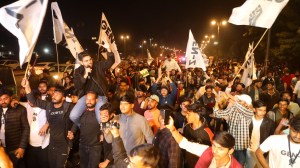Undignified, minister?
About four weeks ago, groups of retired servicemen comprising generals to sepoys gathered at a number of places...

About four weeks ago, groups of retired servicemen comprising generals to sepoys gathered at a number of places all over the country from Bangalore to Chandigarh and Delhi and carried out silent marches to protest against the recommendations of the 6th Central Pay Commission CPC. This was followed by sit-in protests at a few places; totally peaceful and disciplined. When this had gone on for a few days our minister of state for defence, Pallam Raju, labeled it 8216;undignified8217;. This was a strange remark from the political class.
No pay commission has evoked such extreme feelings as the current one. Though there are numerous representations by the service HQ and some retired chiefs, I shall only dwell upon some of the major ones. First was the meagre allocation of military service pay MSP to personnel below officer rank, which is just Rs 1,000 per month. For a long time the services have been asking for a separate compensation for them, because of their unique service conditions. The CPC had raised expectations but the amount was most disappointing for JCOs and other ranks. The biggest blunder, from the services8217; view point, is that the soldiers who always had an edge over the para military forces have now been denied that.
The second aspect, particularly galling to the officer cadre, was that their status was lowered one rung below the existing position by granting pay grades not in consonance with their pay scale and length of service. The higher emoluments at the beginning are no balm for a reduced status. Further, the edge in emoluments is all but neutralised by the 15th year of service when an IAS officer enters Pay Band 4 as recommended by the CPC and the pay deficit for the service officer rises to Rs 8,000.
The status equivalence between ranks is based on pay scale, length of service and span of control. Historically, the length of service as a component of status determination always counted for inter se status. However, over the years, this cardinal principle has been set aside by totally discounting the length of service and solely relying on tangible pay scales and the intangible span of control to determine status and pay scales. In 1937 and 1947, the warrant of precedence equated a major general with a joint secretary of 30 years8217; service. With the passage of time, the IAS through government orders brought down the minimum service for joint secretaries. The promotion to higher posts, especially joint secretaries and above, was increased by creating vacancies rather than by filling existing ones. Thirty-five secretary level posts in 1981 have now increased to 200. Even as the 6th CPC was deliberating its recommendations, the department of personnel and training of the Central government by a gazette notification in February 2008 brought the residency period for promotion to joint secretary and DIG of police to 14 years. This is analogous to 8216;insider trading8217;.
It is conceded by the services that the average age of entry into the IAS vis a vis the services is three to four years higher. Thus a lead of 3-4 years to the IAS would have been completely acceptable to the services but not 18 to 19 years as it is today. In the IAS, 100 per cent officers become joint secretaries whereas in the services only 0.629 per cent attain the rank of major general. If ranks proportionate to the IAS were to be granted to the services they would require 14,000 major generals, 6,000 lieutenant generals and 2,000 army commanders. The intangible span of control is esoteric. Motivating and leading men into battle is not perceived to be as important as lording over some files in the ministry.
Now what prompted the ex-servicemen to sit in peaceful protests, found to be 8216;undignified8217; by the minister? The political culture of our country at the highest levels has undergone a change. We have seen that the agitational approach bears results. Television coverage of the proceedings in Parliament is visible to all. Sit-in protests and relay hunger strikes by our lawmakers on the steps of Parliament have not been missed by anyone. Misguided or not, the ex servicemen merely tried to take a leaf out of that book.
The writer is former vice chief of army staff
- 01
- 02
- 03
- 04
- 05































